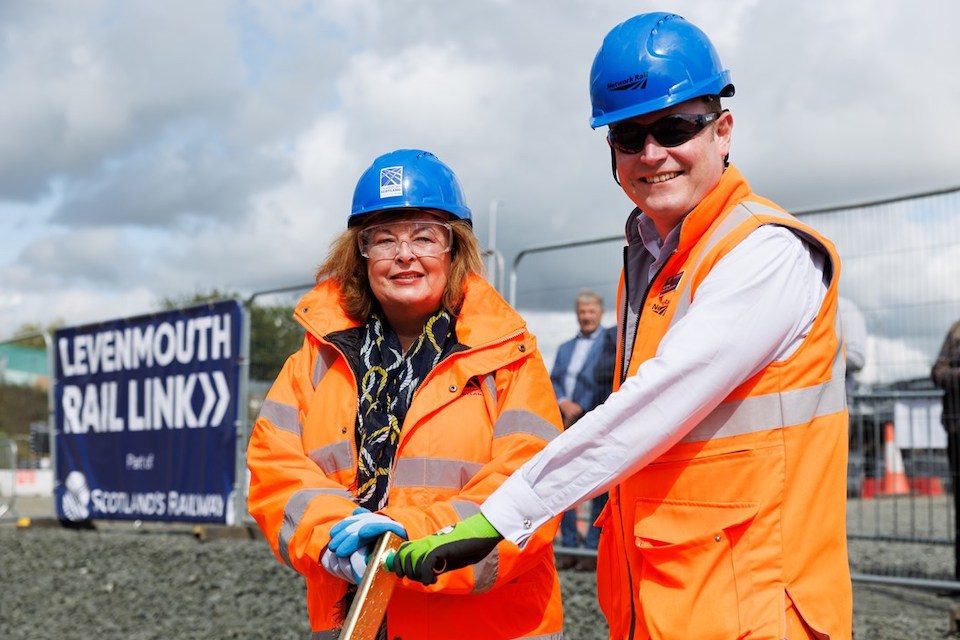This week, the rail freight industry in Scotland has the opportunity to air their views in the presence of the senior minister from the Scottish Government. The Rail Freight Group Scottish Conference will be addressed by Fiona Hyslop, the Transport Secretary at Holyrood. Secretary Hyslop will be laying out her vision for the industry as the keynote speaker. She will be joined by Alex Hynes, the Managing Director of Scotland’s Railway, the government-owned body that has responsibility for delivering reliable passengers and freight services in Scotland.
Political developments will play a big part in the coming year for the rail freight industry. This Wednesday (6 March) will give members of the Rail Freight Group their opportunity to hear how the government in Scotland, which has responsibility for transport affairs, intends to take forward rail freight development in line with their intention to make Scotland’s economy net-zero for carbon emissions by 2045, five years ahead of the target set down for the rest of the UK.
Additional sustainability targets
Grangemouth is the host for this year’s Scottish Conference of the Rail Freight Group. The representative body for the industry in the UK has chosen well. Grangemouth is an apt location, at the heart of several topical debates for the Scottish industry. Grangemouth is integral to the Forth Green Freeport, one of two designed development areas in Scotland (Cromarty Firth in the north of Scotland is the other one). The Green Freeport is a Scottish iteration of the freeport designation, with a legislative obligation to additional sustainability targets in line with those 2045 net-zero ambitions.
The status is similar to the concessions awarded to eight locations in England by the UK government in London. It is worth noting that the owners of Grangemouth – Forth Ports – also have in their portfolio the port complex at Tilbury, downstream from London, on the River Thames. Tilbury is one-half of the designated Thames Freeport, giving the operators at Grangemouth a berth in both camps.
Multi-billion pound investment within the freeport
The Forth Green Freeport encompasses the docks and industrial installations in Grangemouth. The designation extends to a number of ports on both sides of the River Forth, all of which have installed or moribund rail connections. The promotional video above shows reactivated rail connections at Rosyth, for example. The freeport also includes the nearby Edinburgh Airport, which has been the subject of an ambitious plan to provide a direct rail facility within the terminal complex (an idea that was shelved on the grounds of cost).
Grangemouth is very well placed to take advantage of the intended multi-billion pound investment and productivity-generating activities within the freeport. Notably among them is a concentration on logistics – for which the rail yard at the port was recently modernised to handle longer intermodal trains. With a shadow hanging over the huge oil refinery synonymous with Grangemouth, that diversification may not be a moment too soon.
Shake up the policy environment for UK rail freight
Nevertheless, with the Transport Secretary in attendance, it is more than likely that political matters will be a topic of animated discussion. Writing in the latest edition of the members’ magazine, published last week, Maggie Simpson OBE, the director general of the Rail Freight Group, noted that the record number of national elections around the world was equalled by the raft of elections domestically in the UK.
“Here in the UK, we are still no wiser over the date of the next general election, other than it will be this year”, said Maggie Simpson. “We do however know that May brings the local elections which are themselves widespread, and a significant number of Mayoral elections, in London, Manchester, Birmingham, Liverpool amongst others. This backdrop will inevitably affect the policy environment for UK rail freight.”
Concerns and also opportunities for rail freight
Maggie Simpson argues that the flurry of elections, both at national and local level, will encourage governmental focus to turn to short-term plans that can be delivered in months, not years. “It is less helpful for long-term planning and decision-making”, she observes. “The uncertainty will also bring an inevitable hiatus in the debate around rail reform.”

The currently ruling Conservative party published its draft rail reform bill last month. However, the opposition Labour Party, who are odds-on favourites to form the next government, has not yet published its own rail plans. It is widely believed that Labour will seek to roll back the programme of privatisation – at least in the passenger sector. Freight operators have a degree of surety that their operations will remain in the commercial sector. The Labour shadow rail minister, Stephen Morgan, intimated as much at the recent Bradshaw Address event in London.
No political change in Scotland for a while
A similar model already exists in Scotland. The government in Edinburgh, which has devolved responsibility for transport matters, has already taken passenger rail operations into direct management under the Scotland’s Railway banner. However, no matter how well that partnership may work in Scotland, Maggie Simpson will point out to delegates in Grangemouth this week, that economic factors remain an unseen hand, that can be a negative, or positive influence, far more significant than any possible change in government.
“Geopolitical risks remain high, and there seem to be few domestic policy levers that can be pulled, so again, the position could go either way”, says Simpson. “The private sector rail freight industry can get on with new projects and new services without the need for government intervention. The election cycle is no impediment to progress.” That may well come as some encouragement to the Scottish audience. They may well be relived to note that the electorate are not due to be asked to vote for a new Scottish government until Thursday 7 May 2026.